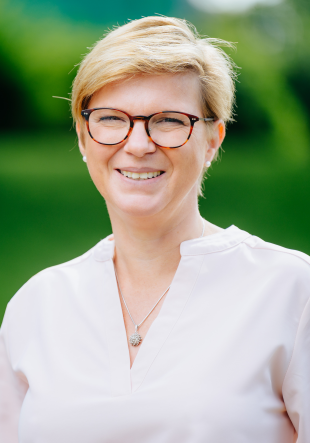Interview with Dr Nicole Satzinger
For two decades, researchers at Paderborn University have been working on innovative concepts for safe, active and environmentally friendly journeys to school. The "Walking Bus" project from the "Childhood and Youth Research in Sports" group is now offered at numerous schools throughout Germany. The idea: primary school pupils walk to school together accompanied by adults. This is not just about exercise in the fresh air - the project also aims to strengthen social skills, promote greater independence and reduce traffic congestion. Since this year, the pupils have also been travelling on bicycles with the so-called "Biking Bus". At the start of the new school year, Dr Nicole Satzinger from Paderborn University's Department of Exercise and Health explains what constitutes an active way to school and where the journey is heading.
Mrs Satzinger, the "Walking Bus" was launched in Paderborn 20 years ago. In your experience, how do schoolchildren benefit most from an active route to school?
Dr Satzinger: "It is particularly important that children enjoy exercise and get to school safely as a group. It also shows that they are more attentive during the first few lessons. The 'Walking Bus' increases the daily exercise time, strengthens the children's independence and promotes social interaction. Another important benefit is the reduction in road traffic in front of the schools. Fewer parent taxis mean safer streets and at the same time a valuable learning experience with regard to correct behaviour in road traffic. Especially in the first years of school, the 'walking bus' offers the opportunity to make new contacts in the neighbourhood, with children and parents. Many children report that they make new friends on the way to school. Parents also appreciate the concept, as they no longer have to worry about the journey to school every morning, but only one day a week. They also know that their child is getting to school actively and safely."
What scientific findings have you and your colleagues at Paderborn University been able to gain from the project?
Dr Satzinger: "The scientific work by Prof Dr Wolf-Dietrich Brettschneider and Prof Dr Miriam Kehne on the 'Walking Bus' is based on extensive empirical accompanying research and evaluation. The results show that the concept makes a sustainable contribution to promoting physical activity among primary school children. One key finding concerns the increase in everyday physical activity: Children who regularly take part in the 'Walking Bus' significantly increase their daily exercise time. In addition, the studies point to positive effects with regard to the ability to concentrate. Collective exercise in the morning therefore has a beneficial effect on learning conditions. In view of the changes in children's lives in recent years, the importance of an active journey to school is therefore more important than ever."
With the "Biking Bus", there is now another exciting project for more exercise in everyday school life. What is the idea behind the "Biking Bus", how does the concept work?
Dr Satzinger: "With the 'Biking Bus', the idea of the 'Walking Bus' is transferred to the bicycle. Children cycle to school together in a group. They are accompanied by so-called 'Biking Scouts' who are specially trained for this task. As with a bus, there are fixed routes and stops where the children can get on. The concept combines safety with community: the children are active, learn the correct behaviour in road traffic and arrive at school motivated. The project was developed at the Friedrich-Spee comprehensive school in Paderborn and organised in collaboration with the 'besslab' movement, play and sports laboratory at Paderborn University, the city of Paderborn and teachers from secondary schools. The initiative was supported by the Paderborn police and the municipal utilities, so that the 'Biking Bus' is now an innovative mobility model for more exercise, road safety and community in the city of Paderborn."
Do you see further potential for new approaches to active travel to school?
Dr Satzinger: "The potential is still great. Mobility education should be integrated into the school system more systematically than before and not just be limited to primary schools. The all-day school programme offers a special opportunity to promote movement and mobility skills beyond the classroom. The aim should be to anchor mobility education in all grades - both in physical education and in extracurricular activities - and to supplement it with interdisciplinary projects, project days or practice-oriented excursions. At the same time, it is important to orientate teacher training so that future teachers can competently integrate this content into lessons and all-day programmes. Cities and local authorities can promote active travel to school in a variety of ways, for example by developing safe footpaths and cycle paths and supporting projects such as the 'Walking Bus' and the 'Biking Bus'. Action and mobility days and scout projects also strengthen children's skills. It is particularly important to involve children, parents and stakeholders in the planning and implementation of such concepts. In addition, networks should be established that accompany and support campaigns and projects in the long term in order to promote exercise, independence and sustainable mobility among children in the long term."



